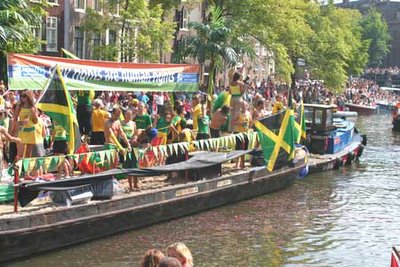 KINGSTON, JAMAICA - A call by Deputy Education Minister Donald Rhodd to discuss the possible repeal of Victorian-era laws criminalizing homosexuality has provoked predictable outrage among conservative Jamaicans. But gays here see the chance for debate as a glimmer of hope that they may one day be able to move out from the shadows.
KINGSTON, JAMAICA - A call by Deputy Education Minister Donald Rhodd to discuss the possible repeal of Victorian-era laws criminalizing homosexuality has provoked predictable outrage among conservative Jamaicans. But gays here see the chance for debate as a glimmer of hope that they may one day be able to move out from the shadows.Criticized by Human Rights Watch a year ago for fostering a climate of violent homophobia, Jamaica lately has joined other Caribbean countries in taking steps toward acknowledging that discrimination and denial have proved counterproductive in efforts to curb the spread of HIV/AIDS.
Still, many in the devoutly religious Caribbean region reject the notion that gays and lesbians should be granted equal protection under the law, including the right to associate openly and receive public services, as well as to marry. At least eight current or former British colonies in the Caribbean retain anti-sodomy laws, including Barbados, St. Lucia and Trinidad and Tobago, as well as Jamaica.
But economic realities and the outside world's scorn of anti-gay violence have begun making inroads in the climate of intolerance.
European impresarios have canceled concerts by Jamaican reggae artists who incite hatred of homosexuals in their lyrics. A Dutch court recently ordered authorities in Aruba to recognize a lesbian couple's marriage. And in St. Lucia, a top tourism official has been trying to sell fellow islanders on the idea that money is to be made as a destination for gay travelers.
The most homophobic of the islands, based on Human Rights Watch's assessment of violence against gays, Jamaica suffers one of the highest incidences of HIV and AIDS, with 1.2% of the population infected. Many believe that the consequences of publicly acknowledging that one is gay have hampered government efforts to halt the spread of the human immunodeficiency virus, which causes AIDS.
At the secluded offices of the Jamaica Forum of Lesbians, All-Sexuals and Gays, or J-FLAG, activists see progress toward a national dialogue in the fight against acquired immune deficiency syndrome but little movement toward accepting homosexuality as a way of life.
"There is still a policy of denial — 'This does not happen in Jamaica,' " said Gareth, who, like most gays here, uses only his first name to avoid discrimination. "People say Jamaica is a Christian country and they do not want to go down the path of allowing homosexuality."
Rhodd's suggestion of a parliamentary debate this winter session on whether to decriminalize sodomy caused a stir, but the issue remains on the agenda.
Although it was just one of 31 topics proposed for debate this session, the subject has dominated radio talk shows and newspaper front pages.
"The reaction, in my opinion, was emotional, based on a high degree of homophobia in the society and also based on the strong condemnation by members of the religious community," Rhodd said of the mostly negative reaction that his proposal elicited this fall in call-in programs, the main forum for public debate among Jamaicans.
Although those leading the fight against HIV/AIDS applaud the government's push to discuss decriminalization, they say the effort must be undertaken slowly to avoid alienating a public still deeply opposed to any notion of gay rights.
"The risk in an initiative like this is that the general public can get left behind," said Robert Carr, a former director of Jamaica AIDS Support now working as an independent consultant. "There's still much to be done in preparing the public for this dialogue."
Lawmakers have yet to schedule discussions, but Carr says their initiative in raising the subject is encouraging.
"If the dialogue is going to be effective, it has to be clear that it is an internal dialogue, not something imposed from outside influences with different agendas," he said.
Although fundamentalist Christians in the Caribbean say the Bible teaches that homosexuality is an abomination, the islands' exotic hybrid culture of African and European spirituality leads others to conclude that same-sex attraction is a consequence of witchcraft, voodoo curse or demonic possession, said Steve Lyston, a Christian fundamentalist and founder of Jamaica's Miracle Prophetic Ministries International.
from LA Times
No comments:
Post a Comment